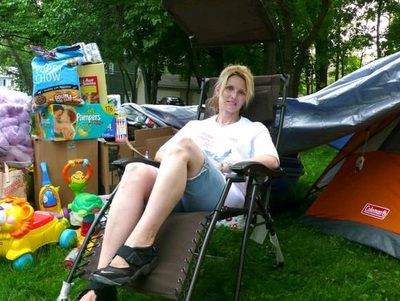1) WHEN PEOPLE DO GOOD (Cont’d)
More stars have been added to a benefit to raise some money for tornado victims in north Minneapolis. Tickets go on sale today. MPR’s Brandt Williams reports the General Mills Foundation has pledged $125,000 to tornado relief efforts in north Minneapolis. The city’s effort to recruit some volunteers for a cleanup effort this weekend signed up the needed 2,000 people quickly. People respond to people. Period.
Mayor R.T. Rybak provided yesterday’s cringe-worthy quote. “There’s no other part of the country that I know of where a tornado could have come and there could have been a better coming together of community response.”
We get it. A pat on the back well deserved. But people aren’t any better or worse here than anywhere else, and it’s not about comparing us to other people, anyway. Good people do good things. For the record, it was a private organization — not the city — that organized volunteers to move into north Minneapolis within minutes of the tornado nearly two weeks ago. It was a private citizen — in New York, no less — who created a Facebook page and Twitter account that became the go-to places for information. It was a group of nurses who went door to door this week looking for people who needed help with anxiety.
But it’s not just here that people rise up. In New Jersey, for example, a woman realized disaster victims are getting lost in the news about stupid things, so she’s set up a tent in her yard and is raising money for people she doesn’t know. “I did it because I wanted to make a statement that I can choose to go camping for a couple of days in my yard,” Berit Ollestad said. “But then when that’s up, I have the choice to go back to my home — and so many people don’t have that choice.”
In Joplin, a group of volunteers from Cedar Falls, Iowa has just shown up to pitch in. It’s churches leading the way, a newspaper editor says.
In times of disaster, people will usually show politicians how compassion works. It’s not as if they expect something for nothing. They just want the pols to lead, follow, or get out of the way…
2) ‘FORGIVING… IS NOT ENOUGH”
MSNBC reports that days after the 9/11 terror attacks, 31-year old laborer Mark Stroman went on a shooting spree in the Dallas area. In a drug-fueled mission of revenge, he killed two South Asian immigrants and shot another — Rais Bhuiyan — in the face at close range, blinding him in one eye. Shortly after his arrest, Stroman boasted of his role as “Arab Slayer.”
Now he’s facing execution and someone is trying to save his life. It’s Bhuivan.
“I realized forgiving him is not enough,” he said. “I must do the best I can to save his life.”
3) OUR WEIGHT AND MY PLATE
The Obama administration tossed the food pyramid down the disposal yesterday, introducing My Plate, a dietary guide that aims to get Americans to eat more fruits and vegetables. It’s an attempt to stall America’s trend to obesity.
It also brought up an old debate: Is the person in charge of the nation’s health overweight? Does it matter?

Most every news story on yesterday’s unveiling ignored Regina Benjamin’s comments.
I, too, have tried the vegetables and salad thing lately. I’m trying to eat more salads at lunch and it’s going well: I’ve had more salads at lunch. The problem is the big bag of M&M’s (with almonds) I destroy two hours later.
4) THE SWAMPS OF DAKOTA COUNTY
Long before we understood their value, we called marshes and wetlands “swamps.” Swamps, as in “useless.”
YouBlue, the Dakota County Technical College blog, provides a great tour of the wetland near the college, with Dan Stinnett, a biology instructor.
“Wetlands work like nature’s kidneys, cleansing pollutants and sediments from water that eventually flows into rivers and oceans,” he said. “But when we drain wetlands, we destroy those kidneys, allowing runoff containing nitrates and fertilizers to reach the Mississippi basin. We now have a dead zone in the Gulf of Mexico the size of New Jersey because those nitrates trigger an explosion of phytoplankton, or microscopic marine organisms. The phytoplankton then die and fall to the bottom, where their remains are consumed by bacteria, a process that uses up oxygen in the water.”
The place sounds like summer.
5) FOLLOW-UP: THE AIRSHOW CRASH
A video of a plane crash during an airshow went somewhat viral after the accident in March…
Although the performers survived, the wing-walker — Amanda Franklin Younkin — died on Friday of her injuries.
Performers, whether they’re in an airplane, on a stage, or anywhere else, are certainly a unique breed. Jimmy Franklin, Amanda’s father-in-law, and Bobby Younkin, her father, were killed during an airshow when their planes collided. And yet, Franklin and her husband did not shy away from the need to go on performing.
Bonus: Google announced today it’s going to stop supporting old browsers. That means people still using IE7 and Firefox 3.5, for example, are out of luck.
Coincidentally, The Nerdery, which is trying to get people to come work for it, has been issuing videos to help their future-employee search, and this topic came up in today’s.
Geek Insights from Jordan Stoltz on Vimeo.
iBonus: A boy in China sold one of his kidneys so that he could buy an iPad, China media reports.
TODAY’S QUESTION
The U.S. Agriculture Department has abandoned the old “food pyramid” of dietary guidelines. Instead, it has adopted a new, simpler symbol called “my plate.” Today’s Question: What rule or guideline governs your eating habits?
WHAT WE’RE DOING
Midmorning (9-11 a.m.) – First hour: Faith and the 2012 election.
Second hour: Student loans from the parents’ perspective.
Midday (11 a.m. – 1 p.m.) – First hour: The budget impasse.
Second hour: Stephanie Curtis on movies.
Science Friday (1-3 p.m.) – First hour: Can hacking be an act of war?
Second hour: What can doctors learn from literature?
All Things Considered (3-6:30 p.m.) – MPR’s Tim Post will report that for decades the University of Minnesota has burned coal at its power plant in Minneapolis to create steam heat, and some electricity, for campus. Now U officials say they’ll dramatically reduce the amount of coal burned in the plant, replacing it with cleaner burning natural gas and biomass. A student group has been pushing for the school to completely end its reliance on coal, a transition that’s happened at several U.S. university campuses in recent years.
A new arts festival launches in the Twin Cities this weekend that runs all night on Saturday. MPR’s Euan Kerr profiles Jim Campbell, who is creating a piece called ‘Scattered Light’ in St Paul. Marianne Combs will have some of the other highlights of the festival.

